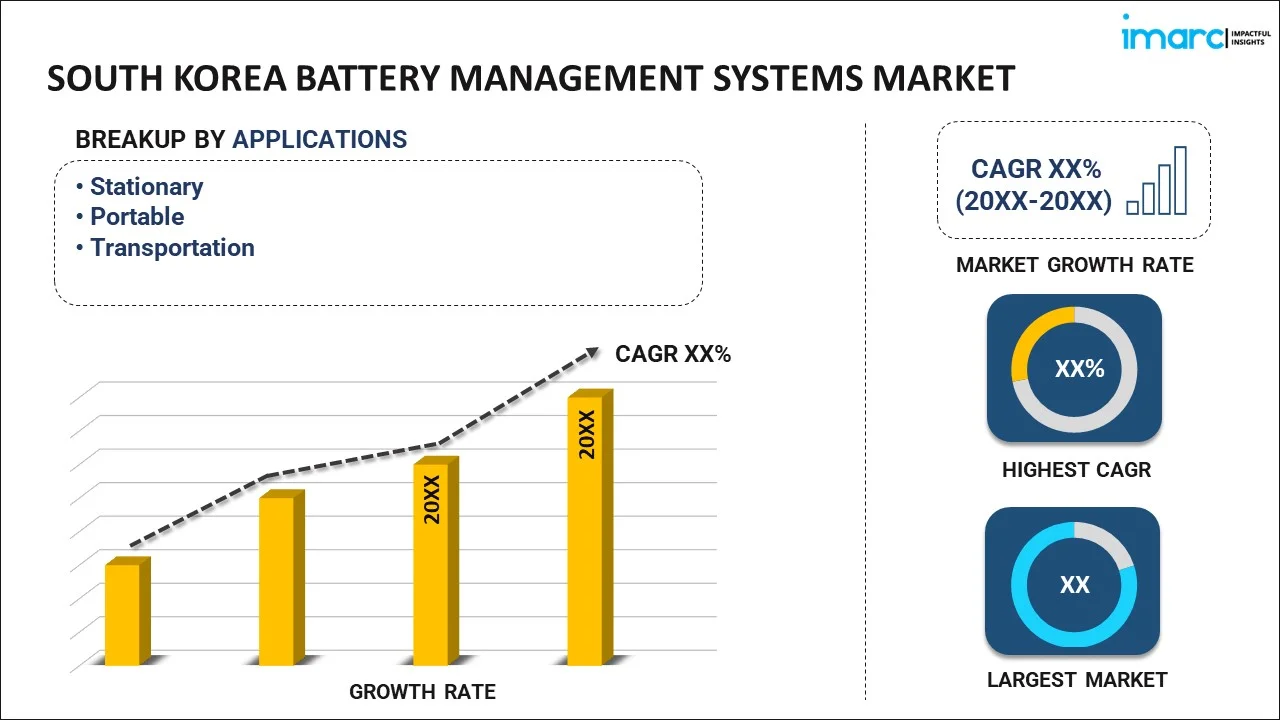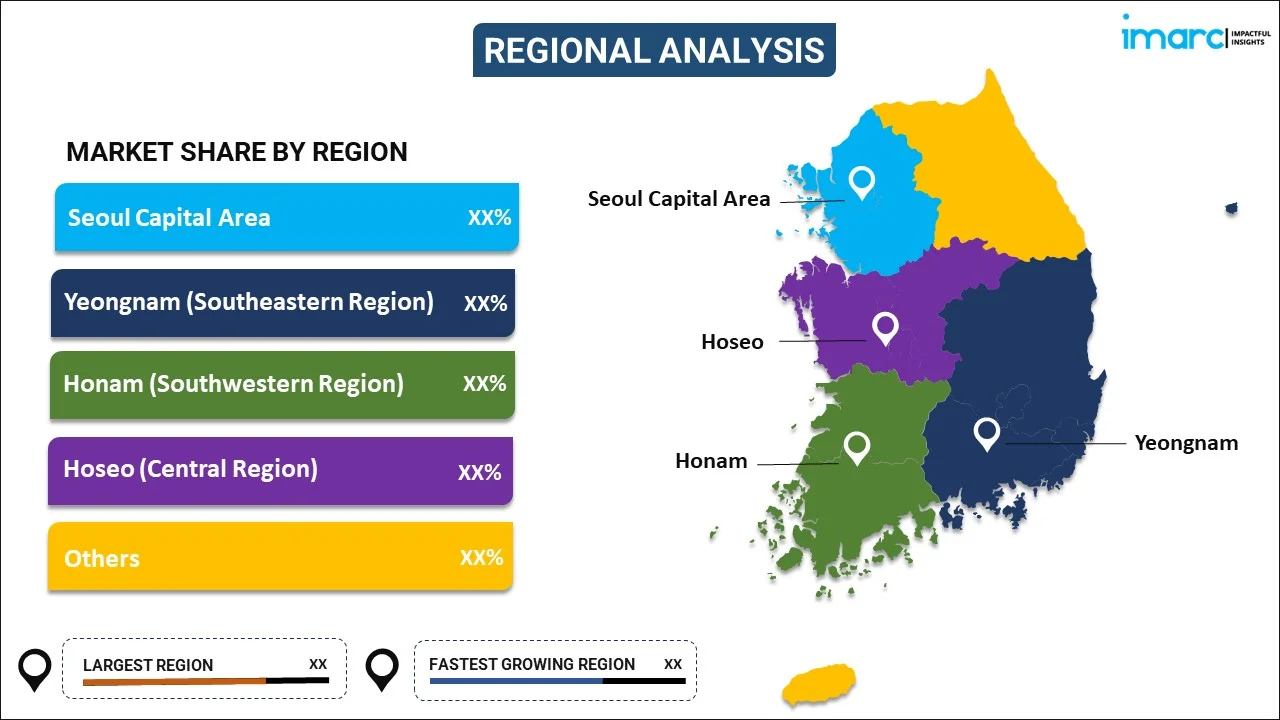
South Korea Battery Management Systems Market Report by Application (Stationary, Portable, Transportation), and Region 2026-2034
Market Overview:
South Korea battery management systems market size reached USD 354.5 Million in 2025. Looking forward, IMARC Group expects the market to reach USD 1,163.7 Million by 2034, exhibiting a growth rate (CAGR) of 14.12% during 2026-2034. The growing use of electric vehicles (EVs) and renewable energy sources, rising demand for high-capacity batteries in EVs and renewable energy storage systems, and increasing complexity of battery systems represent some of the key factors driving the market.
|
Report Attribute
|
Key Statistics
|
|---|---|
|
Base Year
|
2025 |
|
Forecast Years
|
2026-2034 |
|
Historical Years
|
2020-2025
|
| Market Size in 2025 | USD 354.5 Million |
| Market Forecast in 2034 | USD 1,163.7 Million |
| Market Growth Rate (2026-2034) | 14.12% |
Access the full market insights report Request Sample
Battery management systems (BMS) is a crucial component in modern energy storage and power management systems. It comprises passive BMS, which primarily monitors battery parameters and provides protection. It also consists of active BMS, which not only monitors and protects, but also actively balances the charge between cells. It includes distributed BMS, wherein individual battery modules have their monitoring and control systems. It encompasses centralized BMS, which manages multiple batteries or cells from a single central controller. It constantly monitors parameters, such as voltage, current, temperature, and state of charge. It provides protection by preventing overcharging, over-discharging, and overcurrent conditions, which can be hazardous and damaging to the battery. It ensures that each cell in a multi-cell battery pack is charged and discharged evenly to prevent capacity variations among cells. It estimates the state of charge of the battery, helping users understand how much energy is available. It also assesses the long-term health of the battery by tracking factors that influence its lifespan. BMS helps optimize energy storage and distribution, reducing wastage. It saves money in the long run by reducing the need for battery replacement and ensuring energy systems deliver the best return on investment.
South Korea Battery Management Systems Market Trends:
At present, the increasing adoption of electric vehicles (EVs) and renewable energy sources to reduce air pollution and climate change represents one of the crucial factors impelling the growth of the market in South Korea. Besides this, the demand for high-capacity batteries in EVs and renewable energy storage systems necessitates advanced BMS to manage and optimize battery performance, safety, and longevity. Furthermore, ongoing advancements in battery technologies, such as lithium-ion (Li-ion) and solid-state batteries, are catalyzing the demand for BMS as they require sophisticated management to ensure efficient operation and protection against thermal runaway and other safety hazards. Additionally, as industries are focusing on minimizing the downtime and improving productivity, they are relying on BMS to manage the vast array of batteries used in material handling equipment, uninterruptible power supplies, and various other applications. Apart from this, the increasing complexity of battery systems, driven by higher energy density and integration of smart features, is supporting the market growth in the country. BMS providers are focusing on enhancing their products with advanced algorithms, artificial intelligence (AI), and machine learning (ML) to predict battery behavior and optimize performance. Furthermore, the trend toward miniaturization and integration of BMS within battery packs is gaining traction, reducing the physical footprint and weight of BMS, which is crucial in applications like portable electronics and drones.
South Korea Battery Management Systems Market Segmentation:
IMARC Group provides an analysis of the key trends in each segment of the market, along with forecasts at the country level for 2026-2034. Our report has categorized the market based on application.
Application Insights:

To get detailed segment analysis of this market Request Sample
- Stationary
- Portable
- Transportation
The report has provided a detailed breakup and analysis of the market based on the application. This includes stationary, portable, and transportation.
Regional Insights:

To get detailed regional analysis of this market Request Sample
- Seoul Capital Area
- Yeongnam (Southeastern Region)
- Honam (Southwestern Region)
- Hoseo (Central Region)
- Others
The report has also provided a comprehensive analysis of all the major regional markets, which include Seoul Capital Area, Yeongnam (Southeastern Region), Honam (Southwestern Region), Hoseo (Central Region), and others.
Competitive Landscape:
The market research report has also provided a comprehensive analysis of the competitive landscape in the market. Competitive analysis such as market structure, key player positioning, top winning strategies, competitive dashboard, and company evaluation quadrant has been covered in the report. Also, detailed profiles of all major companies have been provided. Some of the key players include:
- Avnet Inc.
- Ficosa International SA
- LG Energy Solutions Ltd.
- NXP Semiconductors NV
- Schneider Electric S
South Korea Battery Management Systems Market Report Coverage:
| Report Features | Details |
|---|---|
| Base Year of the Analysis | 2025 |
| Historical Period | 2020-2025 |
| Forecast Period | 2026-2034 |
| Units | Million USD |
| Scope of the Report | Exploration of Historical and Forecast Trends, Industry Catalysts and Challenges, Segment-Wise Historical and Predictive Market Assessment:
|
| Applications Covered | Stationary, Portable, Transportation |
| Regions Covered | Seoul Capital Area, Yeongnam (Southeastern Region), Honam (Southwestern Region), Hoseo (Central Region), Others |
| Companies Covered | Avnet Inc., Ficosa International SA, LG Energy Solutions Ltd., NXP Semiconductors NV, Schneider Electric SE, etc. |
| Customization Scope | 10% Free Customization |
| Post-Sale Analyst Support | 10-12 Weeks |
| Delivery Format | PDF and Excel through Email (We can also provide the editable version of the report in PPT/Word format on special request) |
Key Questions Answered in This Report:
- How has the South Korea battery management systems market performed so far and how will it perform in the coming years?
- What has been the impact of COVID-19 on the South Korea battery management systems market?
- What is the breakup of the South Korea battery management systems market on the basis of application?
- What are the various stages in the value chain of the South Korea battery management systems market?
- What are the key driving factors and challenges in the South Korea battery management systems?
- What is the structure of the South Korea battery management systems market and who are the key players?
- What is the degree of competition in the South Korea battery management systems market?
Key Benefits for Stakeholders:
- IMARC’s industry report offers a comprehensive quantitative analysis of various market segments, historical and current market trends, market forecasts, and dynamics of the South Korea battery management systems market from 2020-2034.
- The research report provides the latest information on the market drivers, challenges, and opportunities in the South Korea battery management systems market.
- Porter's five forces analysis assist stakeholders in assessing the impact of new entrants, competitive rivalry, supplier power, buyer power, and the threat of substitution. It helps stakeholders to analyze the level of competition within the South Korea battery management systems industry and its attractiveness.
- Competitive landscape allows stakeholders to understand their competitive environment and provides an insight into the current positions of key players in the market.
Need more help?
- Speak to our experienced analysts for insights on the current market scenarios.
- Include additional segments and countries to customize the report as per your requirement.
- Gain an unparalleled competitive advantage in your domain by understanding how to utilize the report and positively impacting your operations and revenue.
- For further assistance, please connect with our analysts.
 Request Customization
Request Customization
 Speak to an Analyst
Speak to an Analyst
 Request Brochure
Request Brochure
 Inquire Before Buying
Inquire Before Buying




.webp)




.webp)












